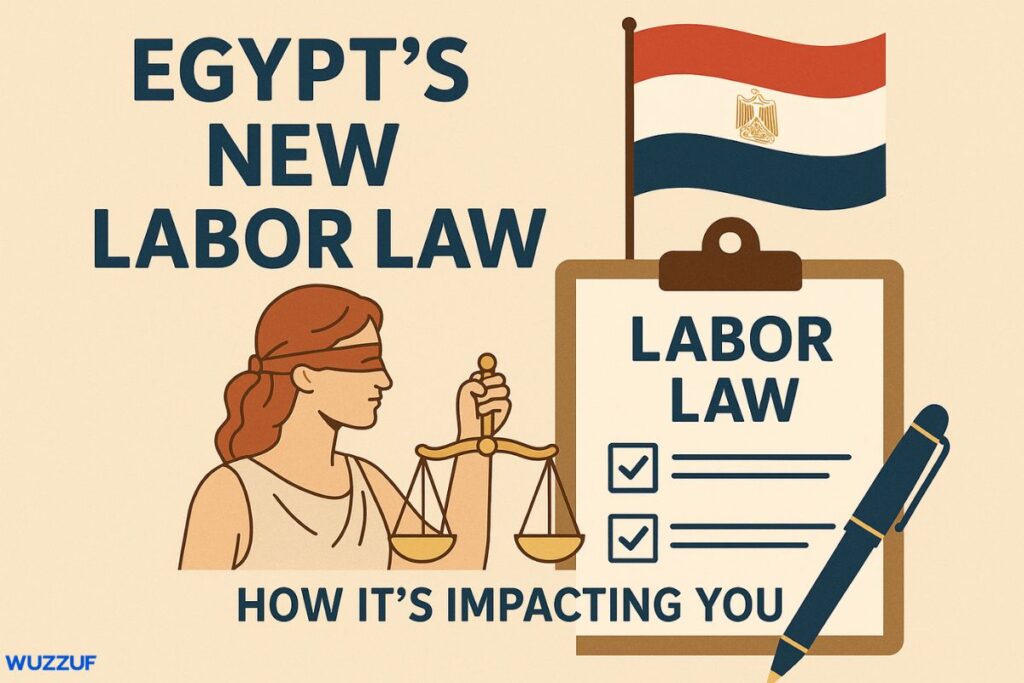Egypt’s labor landscape is changing fast. With the launch of the new Labor Law in 2025, the government has taken a bold step toward reforming outdated practices, modernizing the work environment, and aligning local standards with global labor trends.
Whether you’re an employer, employee, or foreign investor, understanding these changes is essential. Let’s break it down simply and in full detail.
What You Need to Know About the New Labor Law in Egypt

The Labor Law 2025 is Egypt’s most extensive reform of employment in decades. It replaces the previous system with a more protective and inclusive framework that seeks to strike a balance between economic progress and workers’ rights.
Almost every facet of employment is covered by this law, including minimum wage regulations, hiring procedures, dispute resolution procedures, and safeguards for foreign employees.
Why the Labor Law Needed an Update
The previous labor framework, which had been in existence since 2003, had become out of date as work settings changed, technology advanced, and non-traditional employment forms emerged.
Issues including confusing contract conditions, minimal rights for informal workers, and insufficient dispute resolution processes underscored the need for thorough change.
The Old Labor Framework
The Labor Law No. 12 of 2003 was the backbone of employment regulation for over 20 years, establishing the foundation for employment relations in Egypt.
While it provided basic worker rights and employer obligations, it lacked provisions for modern work arrangements, comprehensive dispute resolution, and protections for marginalized groups.
The Push for Reform
In recent years, Egypt’s Ministry of Manpower, along with labor unions and private sector stakeholders, began to push for more robust legal protections and updated regulations.
This push culminated in the drafting and eventual passage of Labor Law 2025, aiming to balance flexibility with protection and ensure sustainable economic growth.
What Sectors Does the New Labor Law Affect?
The new law applies to all private sector employees, including those in informal and seasonal work.
It does not apply to public-sector employees, except in specified circumstances. It also explicitly excludes domestic (household) workers, who will instead be subject to a forthcoming tailored legislation.
When Do the Changes in the Labor Law Come Into Effect?
The law was published in the Egyptian Official Gazette on May 3, 2025, and will come into force on September 1, 2025.
The specialized labor courts are set to commence operations on October 1, 2025
Key Changes Introduced in Egypt’s New Labor Law 2025

The new Egyptian Labor Law introduces several important reforms that aim to enhance transparency, regulate employment relationships, and protect workers’ rights more effectively.
Below is a breakdown of the key changes brought by the updated legislation:
Employment Contracts
In a first for Egyptian legislation, Labour Law No. 14 of 2025 formally recognizes alternative work arrangements such as:
- Remote work
- Part-time employment
- Flexible working hours
- Job sharing
- Platform-based gig economy roles (e.g., ride-hailing apps)
Types of employment contracts under the new law include:
- Indefinite-Term Contracts: Default contract type unless specified otherwise.
- Fixed-Term Contracts: Must be in writing; if continued beyond the term without renewal, they become indefinite.
- Probationary Contracts: Limited to a maximum of 3 months, during which either party may terminate the contract without notice.
Standardized Format
Employment contracts must now be written in Arabic with translations provided as necessary, and prepared in four copies: one each for the employer, employee, social insurance authority, and the Labour Office.
Each contract must include the following details:
- Employer and workplace information
- Employee’s personal data, qualifications, and social insurance number
- A clear description of the job role
- The agreed salary and any additional benefits
Duration and Renewal:
- A fixed-term contract automatically becomes indefinite if both parties continue working after the expiration, except for contracts with foreign workers.
- Contracts longer than 5 years can be voluntarily ended by the employee after five years, with a 3-month prior notice.
- A probation period cannot exceed 3 months and is allowed only once per employer.
Employer Obligations and Record-Keeping
Employers are now legally required to maintain a comprehensive employee file for each worker, which must include:
- Full employment history
- Salary records and changes
- Leave records, penalties, and termination details
- Supervisor evaluations and investigation reports (if any)
These files must be retained for at least one year after employment ends to resolve any potential disputes.
Employment of Foreign Workers
Foreign nationals cannot work in Egypt without a work permit from the Competent Manpower Authority, generally valid for 1–3 years and renewable.
Additionally, foreign workers must not exceed 10% of the total workforce in any business
Employers must maintain detailed records for each foreign employee, covering identity, qualifications, job description, permit details, and salary
Leave Policies
Annual Leave:
Employees who complete a full year of service are entitled to 21 days of paid annual leave, increased to 30 days after 10 years or at age 50+.
Leave can be carried forward for up to two years if unused, and any public holiday that falls within the period of the annual leave is excluded.
Sick Leave:
Employees are entitled to up to 6 months of paid sick leave, with 75% of their salary for the first 90 days and 85% for the remaining period.
Chronic illness entitles employees to 100% salary for an unspecified duration.
Casual Leave:
Casual leave is limited to 6 days per year, with each instance not exceeding two consecutive days.
Maternity Leave:
Female employees are entitled to 120 days of paid maternity leave, up to three times during employment.
During this time, employers cannot terminate or penalize female employees.
Paternity Leave
Fathers are entitled to one day of paid paternity leave per child, up to three children.
Public Holidays:
Public holidays are granted with full pay. If employees work on a holiday, they must receive triple their regular daily wage.
Official public holidays include:
- Coptic Christmas (7th January)
- Revolution Day (25th January)
- Coptic Easter Sunday
- Sham El Nessim
- Sinai Liberation Day (25th April)
- Labour Day (1st May)
- Eid Al Fitr
- Revolution Day (30th June)
- Revolution Day (23rd July)
- Eid Al Adha
- Hijri New Year
- Armed Forces Day (8th October)
- Birthday of the Prophet Muhammad
Additional Leave Types:
- Hajj Leave: A one-time fully paid leave, up to 1 month after 5 years of continuous service, to perform the Hajj pilgrimage.
- Special Circumstances: Short paid leaves may be granted for life events such as marriage, exams, or the death of immediate family.
- Unpaid Leave: May be granted with employer approval for personal reasons.
Working Hours and Rest Periods
Standard Hours:
- Employees may work up to 48 hours a week, typically 8 hours per day across 6 days.
- Working hours for minors should not exceed 6 hours per day or 4 consecutive hours per day.
- Working hours for female employees must be scheduled between 7 AM to 7 PM.
- In emergencies, daily hours can extend to 10 hours, subject to prior approval.
Breaks:
- A 30-minute break must be given every 6 consecutive working hours.
- Female employees are allowed two daily breastfeeding breaks (30 minutes each) during the first 24 months after childbirth
Weekly Rest:
- The standard work week in Egypt is six consecutive days. Employees are entitled to one fully paid rest day per week.
Night Shifts:
- Work between 10 PM and 6 AM qualifies for night shift compensation.
Minimum Wage and Annual Raise
As of March 1, 2025, the National Council of Wages (NCW) has raised the minimum wage for private sector employees to EGP 7,000 per month.
In addition to the monthly minimum, the NCW has mandated that private sector employers provide an annual periodic raise of no less than 3% of the employee’s social insurance wage, with a minimum increase of EGP 250 per month.
Wages must be paid in Egyptian Pounds (or another agreed currency), ideally monthly via bank transfer or another agreed method.
Overtime Rules and Compensation
Employees may work up to 2 hours of overtime per day, but only in special circumstances. Employers must:
- Provide at least 24 hours’ notice before assigning overtime.
- Notify the Ministry of Labor at least 7 days in advance of any extended work periods.
Overtime pay is calculated as follows:
- 135% for extra daytime work
- 170% for nighttime work
- 100% on weekends
- 300% on official public holidays
Health and Safety Regulations
The new labor law places a strong emphasis on workplace safety and dignity. Employers are legally obligated to maintain a safe and healthy work environment.
- All equipment and tools must meet safety standards. High-risk industries (like construction) require additional protective measures and regular training.
- Employers must provide access to medical services and ensure workers’ compensation insurance for work-related injuries.
- Workplaces must implement emergency procedures (e.g., for fire and evacuation) and train employees accordingly.
- The law criminalizes sexual harassment and bullying in the workplace, obligating employers to actively prevent and address such violations, thereby safeguarding employee dignity.
Dispute Resolution and Arbitration
- Disputes (such as wage complaints or unfair dismissals) should first be reported to the Ministry of Manpower and Immigration (MOMI).
- Arbitration is now a required first step before court proceedings. If unresolved, the case can proceed to arbitration or labor courts.
- Dispute resolution must be completed within 90 days of filing
- Employees have the right to appeal suspensions and other disciplinary actions.
Termination and Severance Benefits
Termination must be carried out lawfully to protect both employer and employee rights.
Employer’s Right to Terminate
Termination by the employer is only allowed for legitimate reasons, including:
- Gross misconduct (e.g., false identity, major safety violations, theft, intoxication at work)
- Inefficiency or poor performance, following internal procedures
- Economic downsizing, subject to specific legal steps, and employee compensation
- Retirement at age 60, unless the contract states otherwise
However, employers must follow strict legal procedures and provide compensation.
Employee’s Right to Terminate
- An employee can resign at any time, and is allowed to withdraw their resignation within a week of acceptance.
- Employees can end indefinite contracts due to health, social, or financial issues.
- Female employees can resign without losing their rights in case of marriage, pregnancy, or childbirth.
Compensation on Termination
In economic terminations, employees are entitled to half a month’s salary for each of the first five years of service and one full month’s salary for each subsequent year.
Notice Period:
The party ending the contract must provide a written notice:
- 2 months if the service is under 10 years
- 3 months if the service exceeds 10 years
If the employer gives notice, the employee is allowed paid time off during notice to look for another job.
Notices are not valid during employee leaves and only take effect upon the employee’s return to work.
Retirement and End of Service Benefits
Employers may retire employees at 60 years old unless otherwise agreed in a fixed-term contract.
If the employee continues working beyond retirement age without being eligible for social insurance benefits, they are entitled to:
- Half a month’s salary for each of the first five years
- One month’s salary for each subsequent year
Termination Due to Incapacity or Death
- Total incapacity leads to automatic contract termination
- Partial incapacity must be reasonably accommodated if possible
- Upon the employee’s death, the family receives:
- Two months’ salary (minimum LE 250)
- One month’s salary as a grant
- Two additional months as per Social Insurance Law
Unfair Dismissal:
Dismissals based on discrimination, union activity, political or religious beliefs, and filing complaints or legal action are prohibited.
If found to be unjustified, the employee is entitled to compensation of at least two months of comprehensive salary per service year through the labor court system.
Anti-Discrimination Protections
The law strengthens protections against discrimination based on gender, disability, or age. It prohibits:
- Gender-based discrimination in hiring, training, and promotion
- Termination due to pregnancy or childcare leave
- Wage disparities for the same work
Employers must also accommodate employees with disabilities, including ensuring fair promotion and accessibility.
Training and Human Development
The law encourages continuous training and upskilling by reducing the employer’s training fund contribution to 0.25% of the minimum insurable salary.
Employers can now also require employees who receive company-funded training to stay for a specified period or repay the costs if they resign early, provided this is agreed upon in writing.
Child Labor Reforms
The law sets the minimum working age at 15 (with training allowed from age 14). Employers must:
- Ensure underage workers have a work permit or ID.
- Maintain special logs for working minors.
Night work and hazardous duties are banned for those under 18.
Future Outlook for Egypt’s Labor Market
The implementation of Labor Law No. 14 of 2025 is expected to foster a more equitable and dynamic labor market in Egypt.
By aligning with international standards and embracing modern work arrangements, the law positions Egypt to attract foreign investment and promote sustainable economic growth.
It’s a significant step toward a more structured and equitable labor ecosystem.
What the Changes in Egyptian Labor Law Mean for Employers and Employees

The enactment of Egypt’s Labor Law No. 14 of 2025 marks a major update to the country’s employment framework, aiming to modernize labor practices, boost job market flexibility, and protect workers’ rights.
These changes directly affect how contracts are written, how work hours are managed, and how disputes are handled, with clear responsibilities laid out for both employers and employees.
Here’s a detailed breakdown of what each group should know.
Employers must:
- Review and update employment contracts to comply with new requirements.
- Ensure workplace policies align with the updated regulations.
Provide necessary training to HR personnel on the new law.
Employees must:
- Familiarize themselves with their rights and responsibilities under the new law.
- Report any violations to the appropriate authorities.
What Happens if an Employer Doesn’t Comply with the Law?
Non-compliance can result in:
- Heavy fines and penalties
- Possible suspension or cancellation of business licenses
- Legal actions initiated by employees or the Ministry of Manpower
There’s no longer room for informal, undocumented work arrangements.
How Can Employees Report Violations of the Labor Law?
Employees can report violations to the Ministry of Labor or seek resolution through the specialized labor courts established under the new law. Whistleblower protection measures are also included.
Reports can be submitted anonymously and are investigated within 30 days.
Conclusion
The Egyptian Labor Law 2025 is a massive overhaul—one that brings both challenges and opportunities. It modernizes employment rules, strengthens worker protections, and encourages economic stability.
Whether you’re running a business or clocking in for work, understanding these changes is key to staying compliant and informed.
Ready for your next Career Step?
Explore the best Jobs and Internships in Egypt and Saudi Arabia on WUZZUF Today!